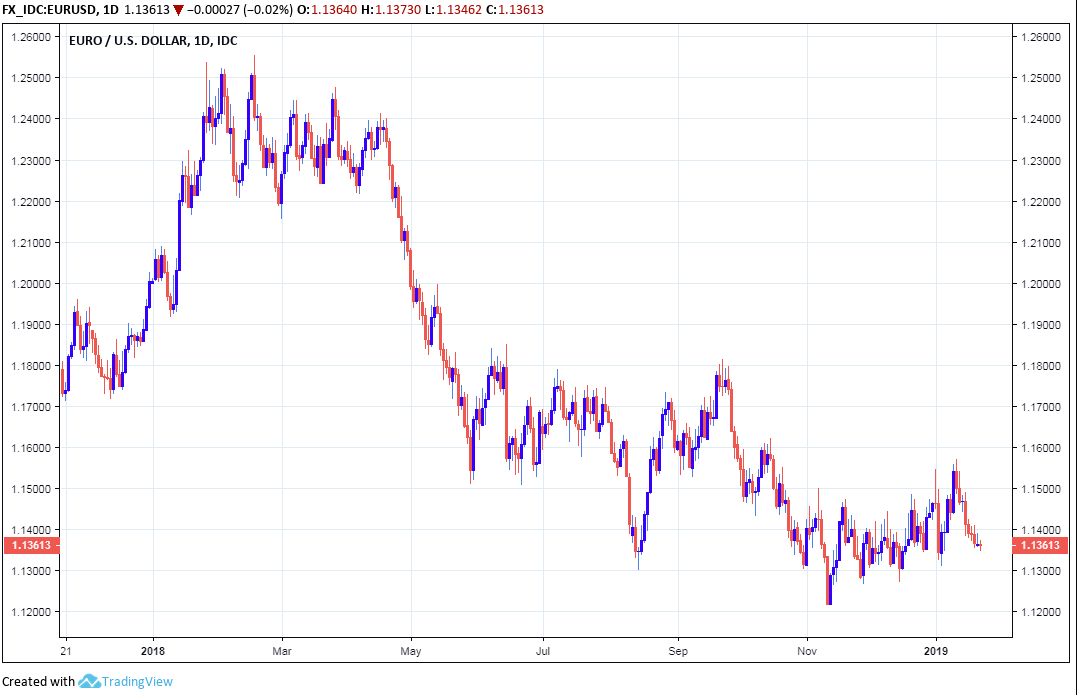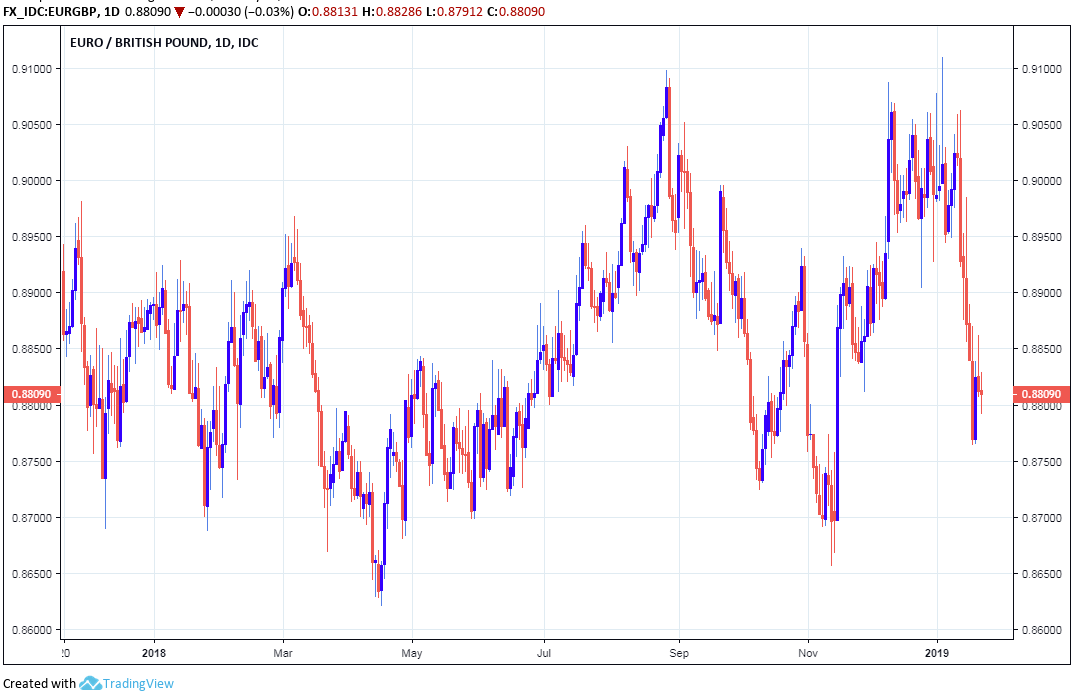Euro-to-Dollar Rate: ZEW Survey Shows German Outlook Stabilising but Doubts Remain
- Written by: James Skinner

Commerzbank HQ looms over the Frankfurt skyline. Image © Andre Douque, reproduced under CC licensing conditions
- ZEW survey shows German investor sentiment stabilising in January.
- But too early to tell if downturn is over says Pantheon Macroeconomics.
- ECB's Thursday response to recent data is key to outlook for EURUSD.
The Euro pared an earlier loss Tuesday after the influential ZEW Leibniz Centre for European Economic Research survey appeared to show the outlook for German businesses stabilising during January, after a torrid three-month period of deterioration.
ZEW's German economic sentiment index rose to -15 in January, up from -17.5 previously, when markets had looed for a further decline to -18.8. The result arrests a three-month period of declines for the index. The Eurozone index rose by 0.1 percentage points to -20.9.
The ZEW survey polls some 300 German institutional investors in an effort to measure optimism about the current and future business situation in the Eurozone's largest economy, as well as across the bloc's other members.
"The financial market experts have already considerably lowered their expectations for economic growth in the past few months. New, potentially negative factors such as the rejection of the Brexit deal by the British House of Commons and the relatively weak growth in China in the last quarter of 2018 have thus already been anticipated,” says Professor Achim Wambach, president of the ZEW.
January's increase may well have come as a result of bad news around the U.S.-China trade war and Brexit already having been taken into account by investors back in December however, that recovery in expectations hides the fact that assessments of the current economic situation actually deteriorated even further this month.
Germany's current economic situation index fell by a staggering -17.7% this month, leaving the balance sat at just 27.6. Meanwhile, the Eurozone current economic situation index fell by -6.8% to just 5.3.
This could ultimately see the forward-looking expectations index turn lower again over the coming months unless the factors driving the deterioration of the current situation are addressed promptly.
"A relative rise in expectations is a bullish signal from this survey, but on this occasion it is being driven almost exclusively by a plunge in the current situation index. We need more evidence to ascertain whether expectations are turning up in earnest," says Claus Vistesen, chief Eurozone economist at Pantheon Macroeconomics.

Above: EUR/USD shown at daily intervals.
The Euro-to-Dollar rate was quoted -0.07 lower at 1.1360 during the morning session Tuesday after recovering from 1.1350 in the wake of the ZEW announcement. The Euro-to-Pound rate was -0.22% lower at 0.8799.
"We think the EUR is cornered on the downside, and although we do not envisage a major breakout in EURUSD as soon as this week, our overwhelming bias is to use levels north of 1.1400 as selling opportunities to aim for a test below the 1.1300 mark over the coming days," says Stephen Gallo, head of FX strategy at BMO Capital Markets. "We’ll play it by ear."

Above: EUR/GBP shown at daily intervals.
Germany's economy has hit the headlines for all the wrong reasons in recent months, after GDP contracted during the third-quarter and output from the nation's mighty industrial sector fell precipitously in October and November.
Implementing new rules governing the emissions testing process for cars hurt factory output last year, but so too did an economic slowdown in China resulting from President Donald Trump's "trade war", as well as uncertainty over the outcome of the Brexit process.
This led economists to speculate that Europe's powerhouse economy may have fallen into a technical recession at the end of last year. Few still say that is the case, although official figures will not be released until next week.
That is bad news for the Euro because the Eurozone economy is also wobbling too. Growth fell to just 0.2% in the third-quarter, down from 0.4% previously and few anticipate a meaningful rebound any time soon. Vistesen says the Eurozone likely grew by just 0.2% at the end of 2018.
"If we are right, it would all but confirm our story of significantly slower growth in the Eurozone over 2019 as a whole thanks to a weaker statistical carry-over effect. We are not suggesting that markets will, or should, trade this fact, but it does mean that consensus and official forecasts for 2019 growth will have to come down," Vistesen writes, in a note to clients.
January's ZEW survey comes just days out from the latest European Central Bank (ECB) interest rate decision and press conference due on Thursday from 12:45 pm London time, which markets hope will bring guidance on what the recent economic slowdown will mean for the bank's monetary policy.
The Euro's appeal to investors has been hinged on the idea the ECB will begin lifting its interest rate from record low levels, and eventually out of negative territory, over the coming months.
However, in order to do this the bank needs to know that inflation is making a "sustainable return" to its target of "close to but below 2%", and Eurozone inflation has remained a long way below the target for some time now without an economic slowdown.
With volatile energy and food items excluded from the goods basket, core inflation remains at 1% and has gone nowhere since early 2015 when the ECB first cut its deposit rate into negative territory and began quantitative easing.
Markets currently have only minimal hope of an ECB interest rate rise in 2019, given the market-implied ECB deposit rate for December 2019 was just -0.31% Monday. The actual rate is -0.4%, so the market clearly sees only a very small chance of a very small change happening in the near future.
However, that alone won't be enough to spare the Euro from further losses over the coming weeks if the ECB signals Thursday that rather than raising rates, it could soon have to support the bloc's economy with fresh stimulus.
Time to move your money? Get 3-5% more currency than your bank would offer by using the services of foreign exchange specialists at RationalFX. A specialist broker can deliver you an exchange rate closer to the real market rate, thereby saving you substantial quantities of currency. Find out more here.





